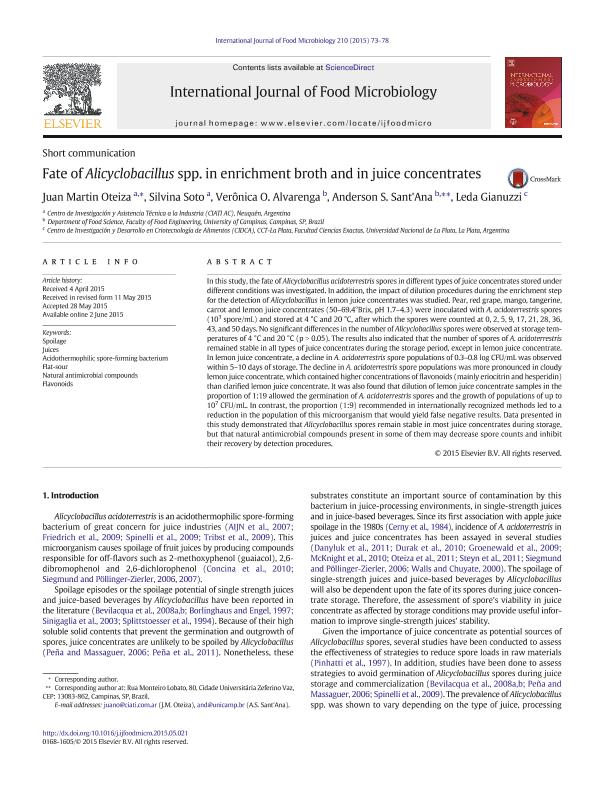Mostrar el registro sencillo del ítem
dc.contributor.author
Oteiza, Juan Martín

dc.contributor.author
Soto, Silvina
dc.contributor.author
Alvarenga, Verônica O.
dc.contributor.author
Sant'Ana, Anderson S.
dc.contributor.author
Giannuzzi, Leda

dc.date.available
2016-12-28T19:03:46Z
dc.date.issued
2015-10
dc.identifier.citation
Oteiza, Juan Martín; Soto, Silvina; Alvarenga, Verônica O.; Sant'Ana, Anderson S.; Giannuzzi, Leda; Fate of Alicyclobacillus spp. in enrichment broth and in juice concentrates; Elsevier Science; International Journal of Food Microbiology; 210; 10-2015; 73-78
dc.identifier.issn
0168-1605
dc.identifier.uri
http://hdl.handle.net/11336/10554
dc.description.abstract
In this study, the fate of Alicyclobacillus acidoterrestris spores in different types of juice concentrates stored under different conditions was investigated. In addition, the impact of dilution procedures during the enrichment step for the detection of Alicyclobacillus in lemon juice concentrates was studied. Pear, red grape, mango, tangerine, carrot and lemon juice concentrates (50–69.4°Brix, pH 1.7–4.3) were inoculated with A. acidoterrestris spores (103 spore/mL) and stored at 4 °C and 20 °C, after which the spores were counted at 0, 2, 5, 9, 17, 21, 28, 36, 43, and 50 days. No significant differences in the number of Alicyclobacillus spores were observed at storage temperatures of 4 °C and 20 °C (p N 0.05). The results also indicated that the number of spores of A. acidoterrestris remained stable in all types of juice concentrates during the storage period, except in lemon juice concentrate. In lemon juice concentrate, a decline in A. acidoterrestris spore populations of 0.3–0.8 log CFU/mL was observed within 5–10 days of storage. The decline in A. acidoterrestris spore populations was more pronounced in cloudy lemon juice concentrate, which contained higher concentrations of flavonoids (mainly eriocitrin and hesperidin) than clarified lemon juice concentrate. It was also found that dilution of lemon juice concentrate samples in the proportion of 1:19 allowed the germination of A. acidoterrestris spores and the growth of populations of up to 107 CFU/mL. In contrast, the proportion (1:9) recommended in internationally recognized methods led to a reduction in the population of this microorganism that would yield false negative results. Data presented in this study demonstrated that Alicyclobacillus spores remain stable in most juice concentrates during storage, but that natural antimicrobial compounds present in some of them may decrease spore counts and inhibit their recovery by detection procedures.
dc.format
application/pdf
dc.language.iso
eng
dc.publisher
Elsevier Science

dc.rights
info:eu-repo/semantics/openAccess
dc.rights.uri
https://creativecommons.org/licenses/by-nc-sa/2.5/ar/
dc.subject
ACIDOTHERMOPHILIC SPORE-FORMING BACTERIUM
dc.subject
FLAT-SOUR
dc.subject
FLAVONOIDS
dc.subject
JUICES
dc.subject
NATURAL ANTIMICROBIAL COMPOUNDS
dc.subject
SPOILAGE
dc.subject.classification
Otras Ciencias Naturales y Exactas

dc.subject.classification
Otras Ciencias Naturales y Exactas

dc.subject.classification
CIENCIAS NATURALES Y EXACTAS

dc.title
Fate of Alicyclobacillus spp. in enrichment broth and in juice concentrates
dc.type
info:eu-repo/semantics/article
dc.type
info:ar-repo/semantics/artículo
dc.type
info:eu-repo/semantics/publishedVersion
dc.date.updated
2016-12-12T14:12:18Z
dc.journal.volume
210
dc.journal.pagination
73-78
dc.journal.pais
Países Bajos

dc.journal.ciudad
Amsterdam
dc.description.fil
Fil: Oteiza, Juan Martín. Centro de Invest. y Asistencia Tec. A la Industria; Argentina. Consejo Nacional de Investigaciones Científicas y Técnicas; Argentina
dc.description.fil
Fil: Soto, Silvina. Centro de Invest. y Asistencia Tec. A la Industria; Argentina
dc.description.fil
Fil: Alvarenga, Verônica O.. Universidade Estadual de Campinas; Brasil
dc.description.fil
Fil: Sant'Ana, Anderson S.. Universidade Estadual de Campinas; Brasil
dc.description.fil
Fil: Giannuzzi, Leda. Provincia de Buenos Aires. Gobernación. Comisión de Investigaciones Científicas. Centro de Investigación y Desarrollo en Criotecnología de Alimentos. Consejo Nacional de Investigaciones Científicas y Técnicas. Centro Científico Tecnológico Conicet - La Plata. Centro de Investigación y Desarrollo en Criotecnología de Alimentos. Universidad Nacional de La Plata. Facultad de Ciencias Exactas. Centro de Investigación y Desarrollo en Criotecnología de Alimentos; Argentina
dc.journal.title
International Journal of Food Microbiology

dc.relation.alternativeid
info:eu-repo/semantics/altIdentifier/doi/http://dx.doi.org/10.1016/j.ijfoodmicro.2015.05.021
dc.relation.alternativeid
info:eu-repo/semantics/altIdentifier/url/https://www.sciencedirect.com/science/article/abs/pii/S0168160515300192
Archivos asociados
